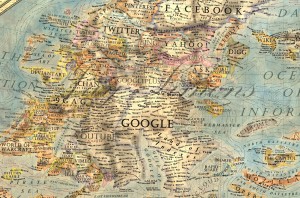All this blog business is a bit new to me… a little bit scary.
I think I’m an analogue guy at heart and I’ve kept my distance from immersing, or even familiarising, myself with anything apart from the most basic Web applications (I’m currently neck and neck with my grandfather… alright, he’s winning – but NOT by much).
I like wide-open spaces and tactile, tangible things. Maps, schematics – anything to help me, a technologically averse buffoon, visualise.
Let me convey my current progress using a visual aid. Here’s a map of the internet, created by Martin Vargic 
You can view this map in all its glory here: http://jaysimons.deviantart.com/art/Map-of-the-Internet-1-0-427143215
Currently I’m swept up in the Torrenz off the coast of Hastag Peninsula. It’s murky waters, but I’m determined to find my way to the land they call Creative Commons. The master of this land, Jimmy Wales, is said to contain some sage WikiAnswers.
If that were an adventure movie I’d watch it. Something like Lord of the Rings, with a charming protagonist (me), in a battle against Worms and Trojans, with only my helpful and wisecracking sidekick Norton to help me navigate these murky waters (there was originally McAfee too, but he tried to kill Norton, so I had to banish him to the Isle of Spam).
How would you visualise such places?
It could make for an epic adventure…
Watch this space.
